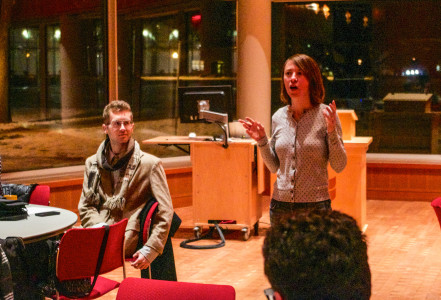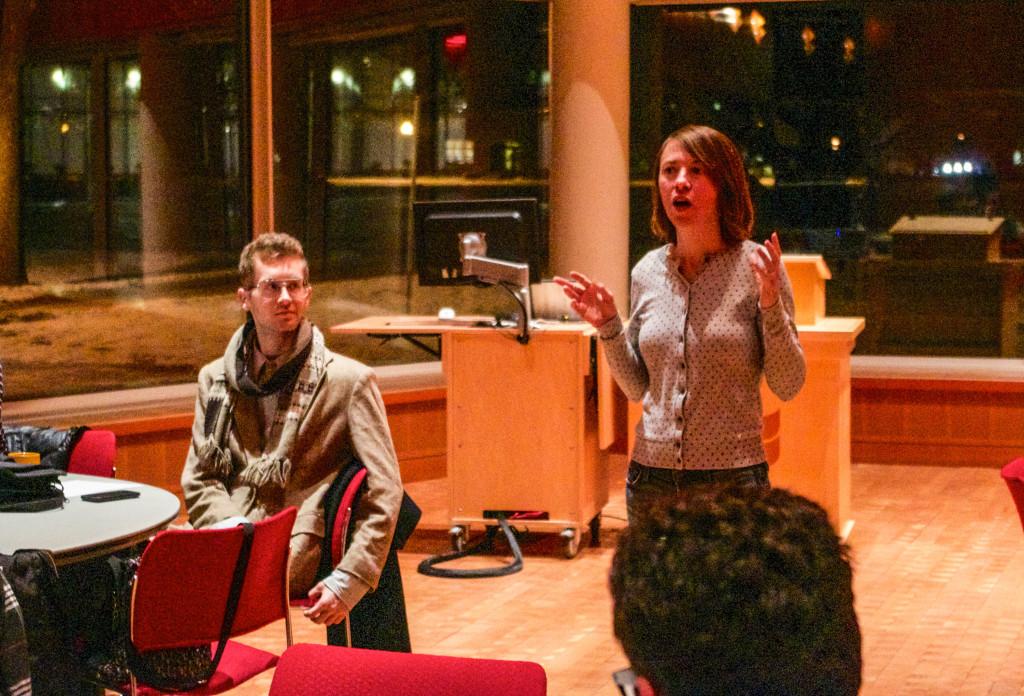The Peace and Conflict Studies Program celebrated a new achievement Monday evening, as members of the Peace and Conflict Studies Committee, along with students from several other colleges, recently published the first ever Undergraduate Journal of Peace and Conflict Studies. Editor-in-Chief Anthony Wenndt ’15, who has been a member of the committee for three years, led the project. Wenndt explained during his introduction of the journal’s Issue Release Reception in JRC 101 on Monday, Feb. 9 that the purpose of the project was to “include the undergraduate voice in scholarly dialogue around peace and conflict studies as a discipline.”
He explained that the field of Peace and Conflict Studies is an enormous interdisciplinary and multilevel field that can encompass work in various academic disciplines, such as political science, international relations, sociology, psychology, anthropology, economics and more. Wenndt added that there is an additional focus on conflicts as large as multinational wars or as small as those within a single person. Although the field is a relative newcomer to academia, he explained that numerous institutions focused on the field have formed within the past two decades.
While the Journal’s first issue boasts numerous works written by Grinnell students, it also includes papers written by students at three other undergraduate institutions: Macalester College, Knox College and Earlham College. The event also featured a special guest contribution by Dr. Kit Miller, Director of the M.K. Gandhi Institute for Nonviolence in New York.
The journal started as an offshoot of Digital Grinnell, an online database run by the College’s libraries system, which, according to Wenndt, “functions as a repository and publication platform [for Grinnell].” The Peace and Conflict Studies program has been using Digital Grinnell for years in various forms.
“In years past, when we’ve had the biennial conference, the manuscripts had been published, but in a format that was not peer reviewed and not scholarly,” Wenndt said.

Photo by Jeff Li
At the event, Coordinator of the Peace and Conflict Studies Program Simone Sidwell introduced Wenndt with a description of his achievements and the program in general. Approximately ten people were in attendance at the event.
After his speech, audience members took part in a lengthy question and answer session with Wenndt and other contributors to the journal also present. The other student contributors, who had submitted papers from an anthropology class they had taken, spoke briefly about the process of having professors review their work. They stated that they enjoyed the opportunity to work closely with professors, both at Grinnell and from the Drake University Law School, to hone their work down into publishable material.
In this first edition of the Journal, the papers published were the proceedings of the 2014 Peace and Conflict Studies Conference and were reviewed and edited by a panel of expert faculty. However, because conferences are only held every other year and the journal will be an annual publication, next year the Committee will call for Grinnell students to submit abstracts for papers that may be considered for the journal, that do not necessarily have to have been written specifically for the journal. Abstracts can come from a wide variety of academic fields, as long as they pertain to the general field of peace and conflict studies.
Students hoping to submit papers to the journal will also work closely with a professor to ensure that their work is fit for publication. The tentative date for publication of the second edition of the Journal is Feb. 1, 2016. The peer review process for papers whose abstracts have been accepted to the journal will begin in May of this year.
In another new development for the program, the College will also offer an Introduction to Peace and Conflict Studies course beginning next year, taught jointly by George Lopez of the United States Institute of Peace and Grinnell’s Professor Timothy Dobe, Religious Studies. Wenndt stated that his vision for the program was even more ambitious.
“Right now, for the first time, we’re actually laying the groundwork for a concentration,” Wenndt said.



















































